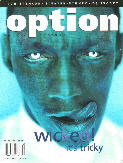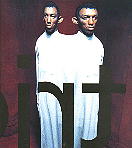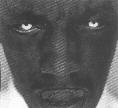



photos: Joseph Cultice
| the tricky question | |
| tricky
picks up his asthma inhaler, sucks
the medication deep in his lungs, then sparks a precision - rolled spliff. Sitting in New York's Tompkins Square Park, the mid-day sunlight reveals a patchwork of mahogany, red and black tones in his skin; aged blue tattoos bleed out from under his long - sleeve shirt onto scarred |
|
| hands and knuckles. His
fingers - one of which is adorned with a surprisingly dainty diamond ring
- are busy mutilating an empty book of matches while his foot does the
non-stop shimmy. "My albums sound so much different than my lifestyle,"
he says. "I rush around, and my music kind of relaxes... But even the mellow
stuff I do is still quite manic. If you listen, there's a lot of tension
and nervous energy there."
A former member of Massive Attack, the Bristol, England-based group that pioneered the trip hop style, Tricky recently finished recording his third solo album, Pre-Millennium Tension, and is in New York to work on several other studio projects, including a hip-hop album called Drunkenstien, and Product Of The Environment, a soundtrack inspired by a screenplay he's writing about an uncle's ganster lifestyle. These will follow two other 1996 releases - Nearly God (Fourth & Broadway), a collaboration with vocalist Björk, Neneh Cherry and Terry Hall of the Specials, and Tricky Presents: Grassroots (Payday), an R&B flavored hip-hop EP. "I can't focus on one thing," says Tricky. "I lose concentration and get bored, then I just don't want to do it anymore. My theory is, if it turns me straight away, I ain't gonna sit there and think about it. If it gives me the initial energy I need, why take it anywhere else?" Tricky's inability to sit still feeds a larger desire - to forge ahead with no set plan, jumping feet first into uncharted musical territory. "If I understand something, I ain't breaking no boundaries," he continues. "How can I comprehend something that never happened before? See? There's nothing wrong with not understanding something. You just decide whether you like it or not, and if you do, throw up yourhands and go with it." |
dISTILLING
BLUES, reggae and hip-hop, Tricky has taken the Bristol-bred sound of trip-hop
beyond its trendy club roots, turning it into his own ghostly hybrid of
pain, beauty and beat. His 1995 U.S. debut, Maxinquaye, offered
layers of sinister, witty and sad sentiments beneath a cool musical exterior,
earning Tricky the title "the King of Trip-Hop" in the U.K. press. It's
a label he abhors.
"People are always making up stupid names for shit," he says, smoking his joint. "All these kids put on baseball caps, set up record labels and call it trip-hop or ambient lounge music or intelligent jungle. What the fuck is intelligent jungle? It's stuff made up by insecure people... I've been fighting against that kind of bullshit the whole time I've been making records." Pre-Millennium Tension follows in the Tricky tradition of no tradition. Less ambient and more aggressive than Maxinquaye, the album writhes with tension. The soulful vocals of Martine Topley-Bird - Tricky's ex-girlfriend and the mother of his 17-month-old daughter Maisey - saunter above the R&B inspired "Makes Me Wanna Die," while other tunes feature scratchy blues riffs looped into virtual mantras and accented by reeling, Hendrix-like guitar works. In "Bad Things," Tricky combines the futuristic blips and beeps of ambient music with guitar feedback and his own manic, evil-sounding whispers. "I think this album's better, more mad," he says. "It's filled with loads of energy and attitude. It's like I got strong again. When I was younger, I wanted to be the best MC in the world, and now I want to be the best musician. It's like 'C'mon, I'll take all of you on.'" Tricky's relaxed composure doesn't belie the fact that he's a fighter at heart. His furrowed brow makes his soft brown |
| eyes appear stormy, and looking
out over the park the street kid in him still seems hyper-aware of his
surrondings. Tricky is wily and antagonistic by nature, though his tough
persona may be the result of a rough-and-tumble upbringing. The wiry, five-foot-eight
artist admits that he drove his family and teachers mad with his obstinance;
later, his mule-like behavior made lasting relationships with women nearly
impossible. Career-wise his adversial tendencies have proved to be an asset,
never allowing him to rest on his laurels. "I've read reviews that called
me Lord of the Slow Beats, so I thought I'd make an album with no slow
beats," he says. "It agonized me into making Nearly God."
Tricky ia a master at turning hope and paranoia into music as complex and layered as his personality. Unlike techno stalwarts such as Underworld or the Chemical Broothers, he doesn't actually pay any attention to the instruments on his albums. Instead he reworks snippets of recorded music until they match his mood, or programs sounds into a keyboard and makes them come alive, breathing. He is among the few contemporary electronic producers who has found a way to squeeze tremendous emotion into processed, mechanized music. In his work, Tricky comes off as a complex, enigmatic figure who can write a rage-filled line like "I'll fuck you in the ass, just for a laugh," and deliver it with cool detachment." A lot of people are scared when they meet me," he says. "I'll try and be funny or silly to bring that down quickly. But sometimes I play it up. There's bands that think they're so angry, like Rage Against the Machine. You want to see angry? I'll show you angry. You want to see bad? I'll show you that, too. I lived it once. It was my life." |
tRICKY
WAS BORN Adrian Thaws 28 years ago in Bristol, a college town that was
once a bustling port for Britain's slave trade. Tricky's half-African,
half-Welsh mother committed suicide when he was four. His father, whose
family migrated from Jamaica, passed Tricky and his younger sister to their
grandmother and uncles to be raised. He grew up in Knowley West, a mostly
white ghetto in Bristol's outskirts. With his father out of the picture,
he looked up to his uncles who he describes as "brilliant... gangsters
that were in the business of protection." Tricky earned his nickname as
a kid: "I would wind all my friends up and make them do tricky sorts of
things like, 'Oh, let's rob that shop. You get in the window first,' and
they would. I only got arrested a few times."
Tricky pauses. "Maybe I was idealistic, but I got beaten down," he says. "Growing up, all your dreams get killed. I'd like things that I can't have back from my childhood. I'd like to fall in love, like the way I did when I was 15. I was so strong and so full of courage, but then you get conditioned and more conditioned. I wish for things like that - for that purity, to be pure again, but you can't 'cause you'd get suckered every minute." He grew up listening to the reggae and jazz records that his uncle played around the house, then discovered Gary Numan and the Specials during grade school. "I used to dream I was onstage singing with Terry Hall," he says. He also discovered American hip-hop. "First it was the Sugar Hill Gang, like 'Hotel, Motel,' and Grandmaster Flash. But my passion come when I first heard Slick Rick and Rakim. That's when I was totally converted. |
|
"Slick Rick talked about walking down the street and bumping into a brawl,
or not having any money, standing outside a club because he couldn't get
in," he continues. Then with Chuck D, that was the first time I ever thought,
'Yeah I'm black, and I'm proud' instead of 'I'll fuck you up to survive.'
I don't feel like that about music anymore. I don't really listen to new
music. I just enjoy making it."
After Tricky left school he worked menial jobs like packing peat moss in a warehouse, but never really assimilated into the working world. Instead, he opted to sell weed, rob houses and hustle for money until he began rapping with local DJs and promoting shows. In the late '80's he met the Wild Bunch, a popular crew of local DJs who would later evolve into Massive Attack. Tricky would begin rappping with the group, contributing vocals to their 1991 debut, Blue Lines, and writing lyrics and producing tracks for the follow-up, 1994's Protection. "I learned to program keyboards just by messing around on one," says Tricky. "I love sounds, so I just tried to make my own. Engineers say I work backwords. I can't visualize that - backwords - but that's what they say. It's probably cause I just don't know how to do it the real way. But I don't want to know. I can't read music, and the last thing I need to do is learn. I mean, who's to say what's right or wrong in music? That's ridiculous." During his early days with Massive Attack, Tricky met Martine Topley-Bird one day as she was ducking out of school. The two recorded the song "Aftermath," which Tricky brought to Massive Attack, but the group decided against using the track. Stifled, he left the group and moved to London to pursue a solo career. Making a name for himself as a DJ in the city's underground dance clubs, Tricky released 1000 copies of "Aftermath" on his own. The single caught the attention of Island, and though Tricky reportedly had no phone or permanent residence, the label tracked him down, signed the artist and re-released his record in 1994. aS TRICKY SITS ON THE GRASS in Tompkins Square Park, a passerby wearing a Walkman and fly-er sunglasses spots him and lingers momentarily. Deciding whether to |
approach the Lord of the Slow Beats,
he chickens out, but tries to look as cool as possible about it. Tricky,
who's showing the effects of New York's soupy summer humidity, is too hot
to notice. The Englishman looks wilted, a condition exacerbated by the
current topic of conversation - his father, with whom Tricky has had no
contact since he was a kid. "Usually the press put my problems down to
my dad leaving me," he says. "But I've got no problem with that. I could
sit and smoke a spliff with my dad and we're cool. He had his problems
and couldn't be around. He had his pressures and couldn't deal with it.
Life is hard. I ain't gonna sit all my life and say you were a bad father.
All I can ask for was my dad to give me birth and life. I can't blame him
for fucking off. I mean, I've got a daughter, and I'll be around cause
I love her, not 'cause it's a condition."
Tricky remembers his mother as a stronger more supportive presence. When he talks about her, there's a rare, unburdened quality to his otherwise weary voice. "I named Maxinquaye after her just 'cause I could," he says. "Now, I go to record shops all over England and see my mum's name there. People have got my mum's name in their house. See," he smiles, "she's everywhere." We leave the park for the cooler surroundings of a nearby cafe, where Tricky slams down an ice coffee. Re-animated, he proclaims, "I'm a Nazi when it comes to music," dissing the generic alternative rock playing on the stereo. "If it rings the least bit false or contrived, I chuck it out. End of story." He is a harsh critic, relentlessly panning those he considers rock poseurs. "Trent Reznor could be standing in a graveyard with his head severed off and tucked under his arm, and he still wouldn't scare me!" he says. "Tupac? I don't believe him." With Tricky, there's no greater ccrime than insincerity. Humanity disappoints him far more that it pleases him, consistently failing to meet his impossible standards. "I talked to DJ Spooky the other day, and that guy knows everything about music - from when it started, originated, bass lines, blah, blah, blah. And you know what? I don't care! If you want to impress me, you make a tune which blows my head off, which rips my heart apart and takes my soul. Then I'll say, 'Wicked!'" |
By Lorraine Ali
Photos by
Joseph Cultice
| analyze me |